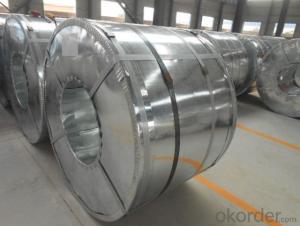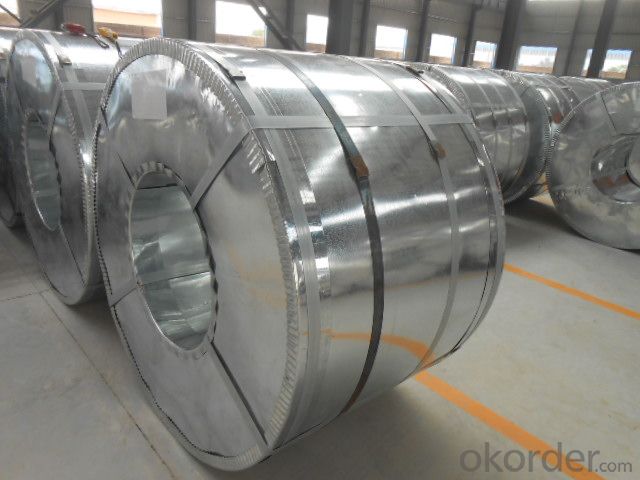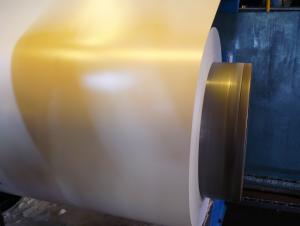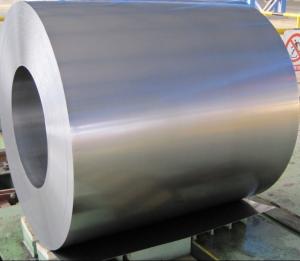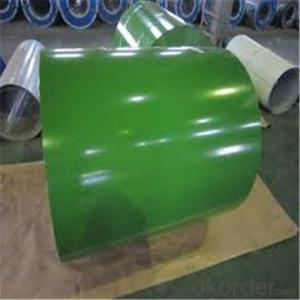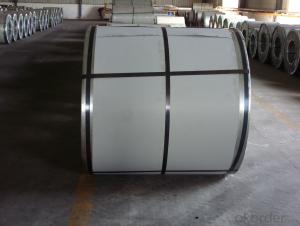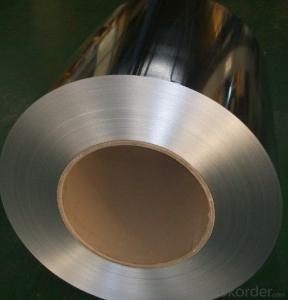PRIME ALUZINC STEEL COIL
- Loading Port:
- China Main Port
- Payment Terms:
- TT OR LC
- Min Order Qty:
- -
- Supply Capability:
- -
OKorder Service Pledge
Quality Product, Order Online Tracking, Timely Delivery
OKorder Financial Service
Credit Rating, Credit Services, Credit Purchasing
You Might Also Like
prime aluzinc steel coil
Types:Commercial / Drawing / Deep Drawing / Structural quality
Width: 900mm/1000mm/1219mm/1200mm/1220mm/1250mm
Thickness: 0.2mm~4.0mm
Type of coating: galvanized
aluzinc coating: 40-275g/m2,40-450g/m2
ID coil: 508mm or 610mm
Coil weight: 3-10/MT per coil
Package:Properly packed for ocean freight exportation in 20''container
Application::home appliances, constructions, building, machineries
- Q: What are the different types of steel coil processing equipment?
- There are several different types of steel coil processing equipment used in the manufacturing industry. These equipment are designed to handle and process steel coils in various ways, allowing for efficient and accurate production. Some of the common types of steel coil processing equipment include: 1. Decoilers: Decoilers are used to unwind steel coils and feed them into the processing line. They are equipped with motorized systems that control the unwinding process, ensuring a steady supply of material. 2. Straighteners: Straighteners are used to flatten and straighten steel coils that may have become distorted during the coiling process. They use a series of rollers to remove any bends or waves in the material, ensuring a smooth and consistent feed into the next processing stage. 3. Slitters: Slitters are used to cut steel coils into narrower strips, allowing for the production of various widths of steel sheets or strips. They consist of multiple sets of circular blades that can be adjusted to cut the desired width. 4. Levelers: Levelers are used to correct any surface imperfections in steel coils, such as wavy or undulating surfaces. They use a series of rollers to apply pressure and reshape the material, resulting in a flat and even surface. 5. Shears: Shears are used to cut steel coils into specific lengths. They can be hydraulic or mechanical and are designed to provide clean and precise cuts, ensuring the desired dimensions are achieved. 6. Recoilers: Recoilers are used to rewind processed steel coils back into a tightly wound coil. They can be motorized or manual and are essential for storage and transportation purposes. 7. Edge trimmers: Edge trimmers are used to remove any excess material from the edges of steel coils. They ensure a clean and uniform edge, allowing for better handling and further processing. 8. Coil cars: Coil cars are used to transport steel coils within the processing facility. They are equipped with hydraulic or mechanical systems that allow for easy loading and unloading of coils onto other equipment. These are just some of the different types of steel coil processing equipment used in the industry. Each equipment plays a crucial role in the manufacturing process, ensuring the efficient production of high-quality steel products.
- Q: I know of the cheaper steel shot for waterfoul hunting, but there is more expensive shot available. Is it worth the money, how much more distance are we talking, and what do you like the best?(brand name)
- In my experience with steel shot, I found that the higher quality stuff usually just patterns more consistently. Although I prefer Federal, any of the other major manufactuers are also great.
- Q: Can someone help me...i have a diagram and were supposed to calculate the steel tonnage needed for the pictre. Can someone tell me step by step what i need to do (ex:find area of ...)
- - Find the cross sectional area of the steel bars if given, if not find the volume of concrete and approximately multiply the concrete volume by 400kg the weight of steel per concrete volume. - If you find the steel cross sectional area , multiply by the
- Q: What are the different grades of steel used in coil manufacturing?
- There are several grades of steel used in coil manufacturing, including low carbon steel, high carbon steel, stainless steel, and alloy steel. Each grade has its own unique properties and is chosen based on the specific requirements of the application, such as strength, corrosion resistance, or heat resistance.
- Q: If a make a dish antenna of steel and of fiberglass, which would be more heavy and also which would be more expensive?
- Steel will be heavier but easier to manufacture. There won't be a huge weight advantage because you can use steel mesh which works the same as solid, near enough, as an electromagnetic reflector. Steel can just be pressed, fiberglass has to be laid up of resin and mat and then allowed to cure. Fiberglass will also need to be coated in something conductive whereas you can just spray paint the steel, or even buy it pre-coated.
- Q: How are steel coils used in the manufacturing of tubes?
- Steel coils are used in the manufacturing of tubes by being unwound and fed through a tube mill where they are shaped and welded together to form seamless or welded tubes.
- Q: How are steel coils used in the production of pipes and tubes?
- Steel coils play a crucial role in the manufacturing of pipes and tubes. They serve as the primary material for shaping the cylindrical structure of these products. The process begins by unrolling the coils and feeding them into a pipe or tube mill, where a series of manufacturing procedures take place. Initially, the steel coils are unwound and straightened to eliminate any bends or twists. Subsequently, the edges of the coils are trimmed to ensure a smooth and even surface, a technique referred to as slitting. Following this, the coils are passed through a forming machine, which bends them into the desired shape. For pipes, the coils are shaped into a circular form, whereas tubes can be molded into different configurations like square, rectangular, or oval. Once the coils have been shaped, they are welded together along their length to create a continuous pipe or tube. This welding process can be accomplished using a variety of techniques, such as high-frequency induction welding, electric resistance welding, or submerged arc welding. After the welding process is complete, additional procedures may be carried out on the pipes or tubes to enhance their properties. These procedures may involve heat treatment, like annealing or quenching, to improve strength or hardness. Finally, the pipes or tubes are cut to the desired length and may undergo further finishing processes, such as straightening, polishing, or coating, depending on their intended application. In summary, steel coils serve as the foundational material in the production of pipes and tubes. They are unrolled, straightened, and molded into the desired shape before being welded together to create a continuous product. Additional processes can be applied to improve the properties and meet specific requirements of the pipes or tubes.
- Q: Can I ever get my classical guitar reinforced so it can have steel strings on it?
- describes the differences in construction of classical nylon string guitars and steel string guitars--like I said, it would involve reconstruction of more than just a neck
- Q: I wrote in my assignment that mild steel has a high carbon content (4%).This is why it has its strong and rigid properties.. is this correct?
- Steel is defined as an alloy of iron and carbon (often supplemented by further materials) with a carbon content between 0.01 % and 2.06 %. 4% is in the realm of cast iron, which isn't quite as rigid as steel. Mild steel contains 0.16 - 0.29% carbon. You're off by more then a decimal.
- Q: With the Reduced weight of steel,wouldn't the projectile be at a much higher velocity when fired causing more damage?I mean l couldn't steel be worked to seal the bore,not damage the rifling and still cheap enough to mass produce,and be light enough to carry much more ammo.
- The bullet needs to be a bit malleable to conform to the grooves in the barrel. In an American .30 gun a .308 bullet is forced out of the gun it has to conform to the .30 bore and .308 grooves to form a tight seal. That's why lead and copper are the primary materials of the bullet. A steel bullet in a steel bore would potentially produce a pipe bomb or at least do significant damage to the bore. Also, the weight of bullets are optimized for their application with the current materials. There is no need or desire to reduce the mass of the bullet. Simply reducing mass for increased velocity can effect the terminal ballistics in all kinds of ways, but you cannot assume that damage will be higher for a variety of reasons. If nothing else the fact that the military has INCREASED the 5.56x45mm from 55gr to 62gr should be enough to doubt your claim. Also steel is about 70% the density of lead, so there would not be a major savings in mass, but aluminum is only 25% the density and it is much closer to the hardness of lead. If you really wanted a light bullet, the aluminum may be the way to go.
Send your message to us
PRIME ALUZINC STEEL COIL
- Loading Port:
- China Main Port
- Payment Terms:
- TT OR LC
- Min Order Qty:
- -
- Supply Capability:
- -
OKorder Service Pledge
Quality Product, Order Online Tracking, Timely Delivery
OKorder Financial Service
Credit Rating, Credit Services, Credit Purchasing
Similar products
Hot products
Hot Searches
Related keywords
